The Inauguration: An Unticketed View
Come with me on a journey to the inauguration of Barack Obama.
It was an epic day, not just for him and for the country, but for nearly 2 million of us who made it to the Mall to stand witness with the 44th president at his swearing-in.
Many faced hardships getting home that could have invited tragedy. There were hundreds of elders in wheel chairs, and thousands more of all ages ill-dressed to withstand hours outdoors with the temperature frozen in the 20s. Government buildings that might have provided warmth and respite were locked down, and the Metro shut its gates and ran at least some half-empty trains from downtown. As soon as the ceremony on the West Front of the Capitol ended, the festive Jumbotrons flashed blue with a foreboding message: “Persons exiting the Mall should expect heavy pedestrian congestion … ALL EXITS NORTH ARE CLOSED.” In keeping with the sober theme of the new president’s address, perhaps this was all a plan to steel us for challenges ahead. Still, as Virgil said, perhaps one day it will bring us joy to remember even these things.
But I’m jumping ahead.
My journey began improbably late – 10 a.m. – at the King Street Metro station in Alexandria, Va., where trains had been running since 4 a.m. On television it looked like vast stretches of the Mall had been full since dawn, despite the subfreezing temperatures. But I wasn’t trying to get anywhere near the U.S. Capitol. I’d view the ceremony from the other, unscreened end of the Mall.
Two decades earlier, as a pool reporter, I stood on the West Front balcony 75 feet from George H.W. Bush as he took the oath of office. In a photo that sits above my desk, I can see myself scribbling notes on a legal pad in the back behind all the members of Congress. It was incredible to look out over that sea of people, but today, with neither ticket nor credential, I was gladly trading proximity for freedom, and looking forward to the view from ground level.
With two hours left in the Bush administration, only a few dozen stragglers were queued up at the fare machines. I waltzed through with Metro’s equivalent of an EZPass and rode the Yellow Line to the Arlington Cemetery stop, where pedestrians and bicyclists were streaming down the Esplanade and across the Memorial Bridge, the only Potomac River span open into the city. I was dressed for the cold – two pairs of socks, down vest and coat, knit cap and sleek new thermals to replace the 30-year-old woolies in my dresser – but I felt the bite of the wind as I crossed the bridge. Ice floes had formed on the Potomac during the cold snap of the past week. Midway, I met a couple wheeling a crying toddler back home. Seventy years from now, when she tells her grandchildren she attended Barack Obama’s inauguration, that will be a white lie.
Scaffolding from Sunday’s inaugural concert was still up, but the view from the steps of the Lincoln Memorial was unobstructed. The Jumbotrons had been spirited away from the reflecting pool to the other end of the Mall, so the hundreds seated on the Lincoln Memorial’s steps – including a spirited group holding up signs from Eagle Valley Hill School in Gypsum, Colo. – had contented themselves with listening to the ceremony. The loudspeakers carried the sound to the farthest reaches. I moved on, determined to get within eyeshot of a Jumbotron. Most of the thousands alongside the reflecting pool were moving the same way.
For all the extra layers of security laid on for this day – we’d seen Humvees at every intersection before Sunday’s concert – it seemed the police and park rangers had disappeared from this end of the Mall. A handful of officers stood toward the back of the crowd that filled the National World War II Memorial, but made no move to evict the young people who had clambered atop walls and columns to view the Jumbotrons. They gave a new, young face to the granite memorial.
It was 11:40 a.m. when I got close enough to espy a Jumbotron. I squeezed into a corner, raised my monopod and captured the unfolding scene as Pastor Rick Warren delivered his invocation, Aretha Franklin sang a great “My Country, ’Tis Of Thee,” and Joe Biden swore his oath. The composition that John Williams composed for Yo-Yo Ma and others to play heavily sampled Appalachian Spring and the American Shaker hymn, “’Tis a Gift to Be Simple.”
I’ve read that the new president’s term begins at the dot of noon, regardless. It was 12:06 p.m. when Barack Obama raised his right hand and put the other on Abraham Lincoln’s Bible, held by Michelle Obama ’85. Now, I’m not saying I could recite the 35-word oath of office from memory, but it is in the Constitution, and most of us know the sounds and cadence of those words. All around me, everyone, like Barack Obama, realized that Chief Justice Roberts was taking liberties with the word order.
In Roberts’ defense, I’m sure it was cold up there. He may lead the third branch of government, but he had never been under a spotlight like this. The chief justice needed someone to come up, give him a hug, and guide him through the words, the way that Mo Cheeks helped that girl with the national anthem at an NBA game a few years back. Or he could just carry a copy of the Constitution.
I was getting a lot of shots of the backs of people’s heads at the World War II Memorial. I needed some faces. As President Obama spoke, I worked my way around to 17th Street and turned back to see all those faces intently watching him speak on the Jumbotron. From 40 yards away, I took the frame that shows a dozen or more young people perched atop the World War II Memorial, the Lincoln Memorial at their backs. Closer to 17th Street, three young woman from Orlando, Fla., attracted a horde of photographers by holding up a large sign saying, “You May Say I’m A Dreamer … I’m Not The Only One.”
I moved on, trying to reach the Washington Monument, with its commanding view of the Capitol and the crowds in between. There was room enough for three guys to kick a soccer ball, but the crowd packed in again in front of a Jumbotron near 15th Street and Constitution. I took a picture of the White House sitting serenely above the Ellipse. Only later, when I put the pictures on my computer, did I realize there were two big, white moving vans in the driveway outside the South Portico. It was 12:25 p.m. and the new president’s address was winding down.
I’d heard phrases that, had I been standing up there against the wall of the Capitol’s West Front with my legal pad, I would have been furiously scribbling down:
“Know this, America: (These challenges) will be met.”
“Starting today, we must pick ourselves up, dust ourselves off, and begin again the work of remaking America.”
“What the cynics fail to understand is that the ground has shifted beneath them.”
“To all other peoples and governments who are watching today, from the grandest capitals to the small village where my father was born, know that America is a friend of each nation, and every man, woman, and child who seeks a future of peace and dignity.”
“The world had changed, and we must change with it.”
“What is required of us now is a new era of responsibility.”
“This is … why a man whose father less than 60 years ago might not have been served at a local restaurant can now stand before you to take a most sacred oath.”
There was eloquence, but it was an eat-your-vegetables inaugural address. His message to the faithful on the Mall was: Yes, we pulled this off. Now the real work begins.
Heaven knows how long some of the people around me had been standing there, but most were happy to break camp. Elizabeth Alexander’s poem did not register; I was on the move again. The Rev. Dr. Joseph E. Lowry, 87, a warhorse of the civil-rights movement, gave the final prayer, at first sounding as if the cold had frozen his vocal cords. But quickly his voice gained power. “Lord, in the complex arena of human relations, help us to make choices on the side of love, not hate; on the side of inclusion, not exclusion; tolerance, not intolerance,” he prayed.
Lowery’s closing made everyone laugh and cheer.
“Lord … we ask You to help us work for that day when Black will not be asked to get back; when Brown can stick around, when Yellow will be mellow; when the Red Man can get ahead, man; and when White will embrace what is right. Let all those who do justice and love mercy, say Amen.”
“Amen,” voices responded.
“SAY AMEN,” the preacher said.
“AMEN,” we called back.
“And Amen!”
“AMEN!”
I stayed atop the Washington Monument’s mound long enough to see George Bush’s helicopter fly high overhead shortly before 1 p.m. en route to Andrews AFB and the flight home to Texas. I won’t bore you with a blow-by-blow account of the difficulties of moving off the Mall. I could head back out the way I’d come – that was the path of least resistance – but I wanted to try the escape route that my wife and I had followed after Sunday’s concert, heading down Independence and over to L’Enfant Plaza, where I knew a side entrance to Metro that wasn’t visible from the streets.
It was for naught. My side entrance, including a long wheelchair ramp, was mobbed, and the doors to the transit station were locked. For the first time since crossing the bridge this morning, I could feel the cold. By now, it was 2:15 p.m.
Then three things happened that restored the spring to my step.
As the crowd waited for Metro to open, a baritone voice near the door boomed a familiar chant, with a twist:
“OOOO-Bama, OOOO-Bama, Hey, Hey, Nah, Nah!”
Soon everyone picked up the chant.
“OOOO-Bama, OOOO-Bama, Hey, Hey, Nah, Nah!
“OOOO-Bama, OOOO-Bama, Hey, Hey – We Got Him Now!”
I never saw the singer, but he gave us all a lift.
I headed down to the waterfront to try to work my way back to the Memorial Bridge. Under a railroad overpass near the Tidal Basin, I passed several neatly made beds that homeless people call home. I headed counter-clockwise down the path that tourists take to see the cherry blossoms in springtime when a group of schoolchildren in yellow knit caps started skipping my way. I asked a teacher where they were going. “The 14th Street Bridge to Virginia,” they said.
“But it’s closed to pedestrians.”
“The police told us we could cross.”
And indeed they did. The powers that be had just opened the HOV lanes – a separate bridge – to foot traffic. The police stopped traffic on the other bridge so the fifth-graders from Concord Elementary School in Anderson, S.C., and other refugees could scamper over a Jersey barrier and hoof it over the empty bridge to Crystal City and the Pentagon City Mall. They posed in front of the Jefferson Memorial for a class photo.
I hadn’t taken many pictures in the preceding hour, but now I had the monopod extended again and was firing away. Back on land, Virginia state police directed us across a field and on the final leg of the journey. I fell in step with Sandra Brandt of Virginia Beach, hustling to catch a flight at Reagan National Airport. She had had VIP seats for the ceremony. Brandt was an elector, one of the 365 people who actually did elect Barack Obama president of the United States (the other 173 electors cast their votes for John McCain).
Like me and the kids from Anderson, Brandt had endured a modicum of hardship on this hegira out of Washington. But with the winter sun now shining brightly on the Potomac and on Crystal City, the landscape already had taken on a warmer patina, and we were left with the abiding satisfaction of knowing that when Barack Obama became president of the United States, we were there.


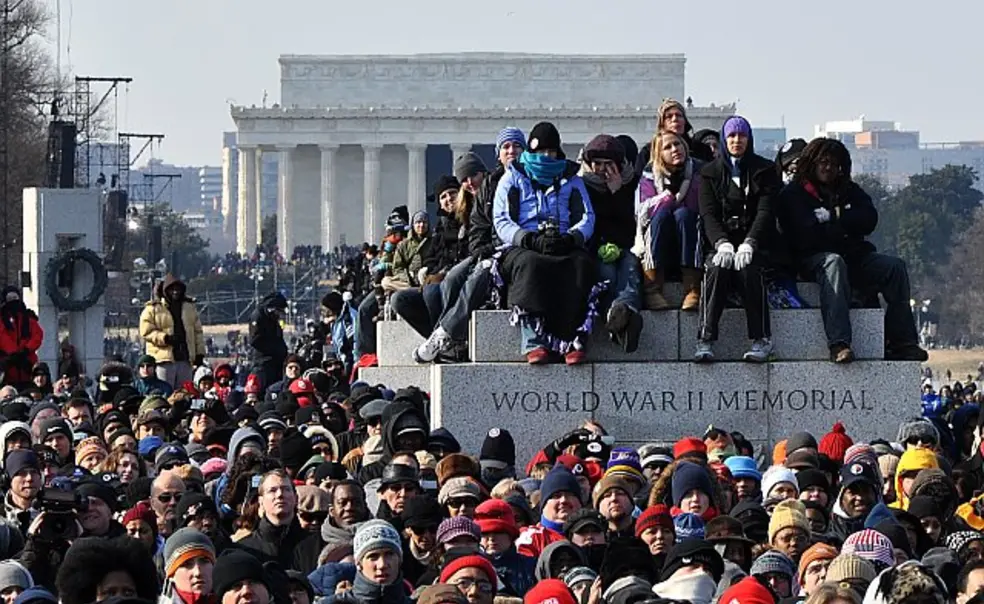
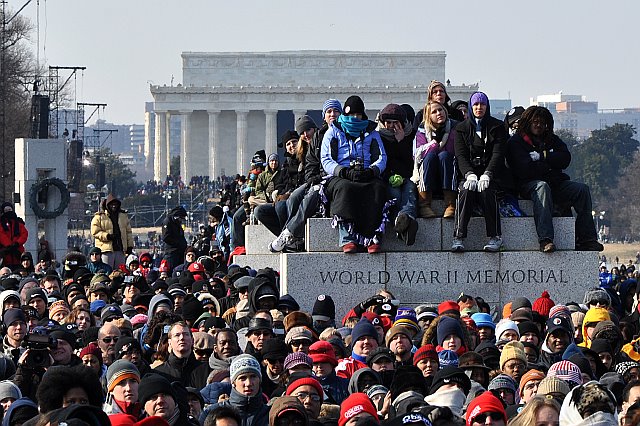

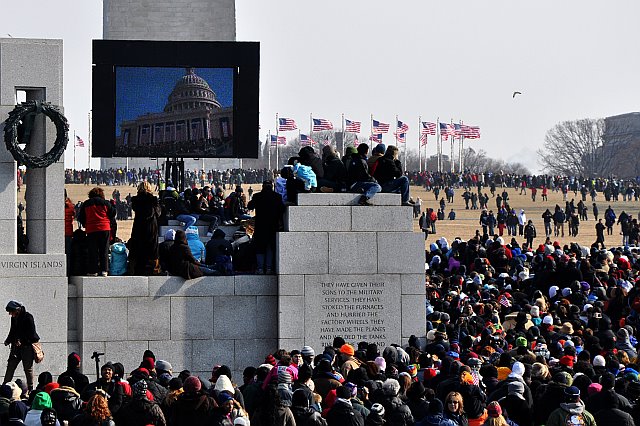
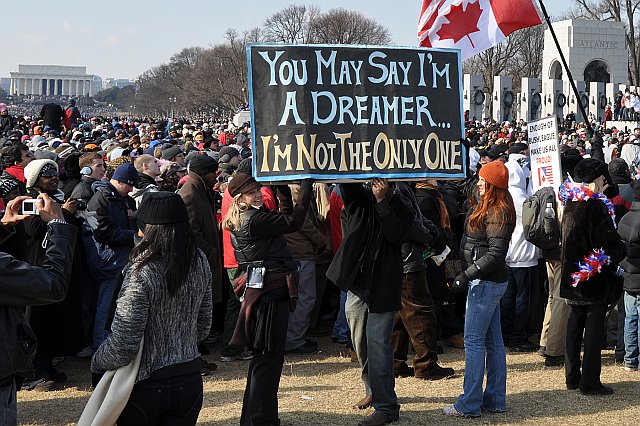

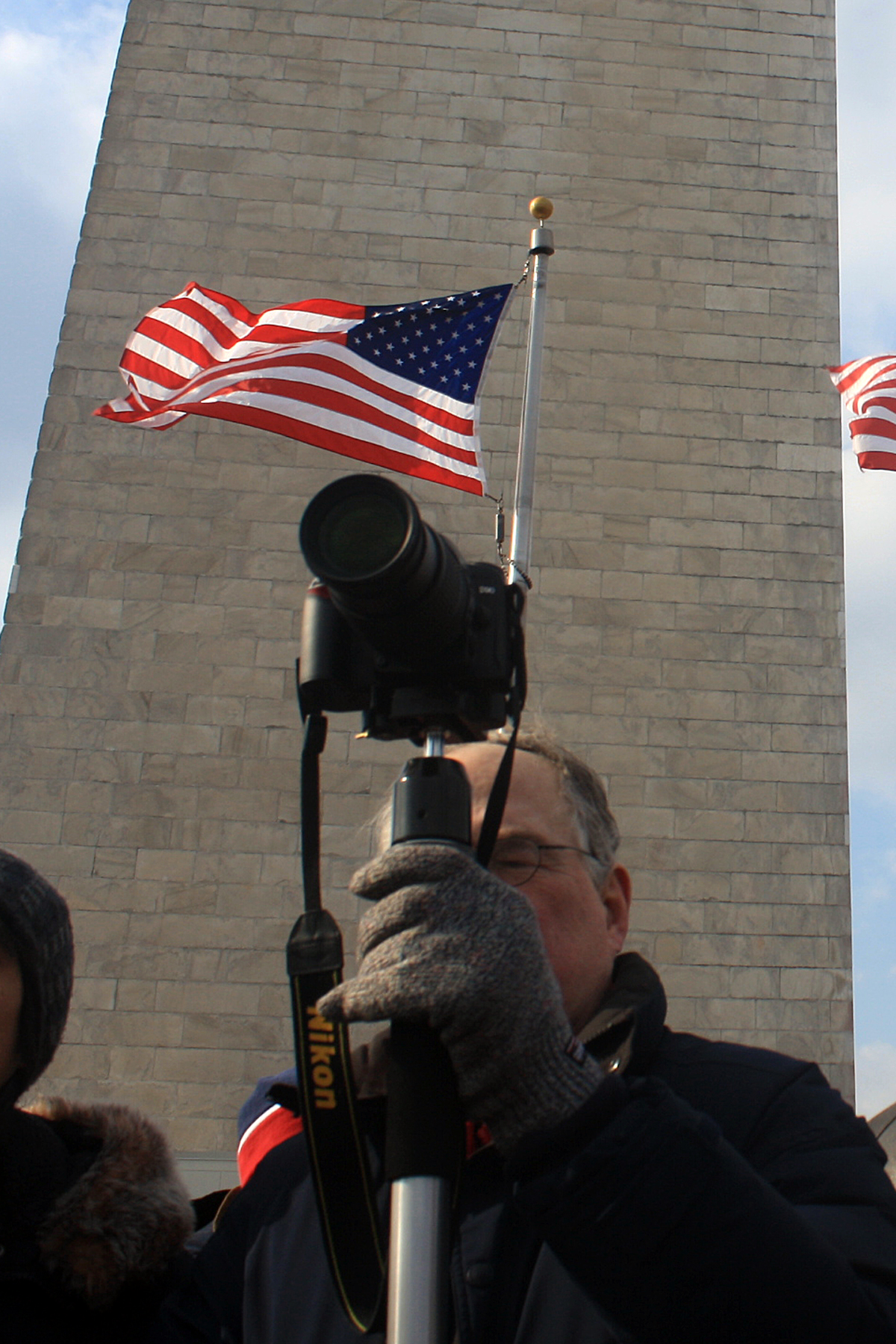









No responses yet